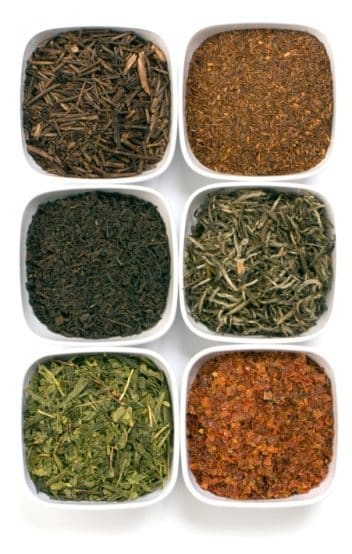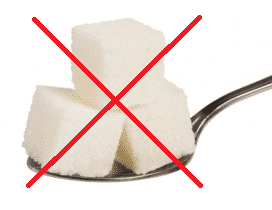The Complete Guide To Choosing Kombucha Ingredients
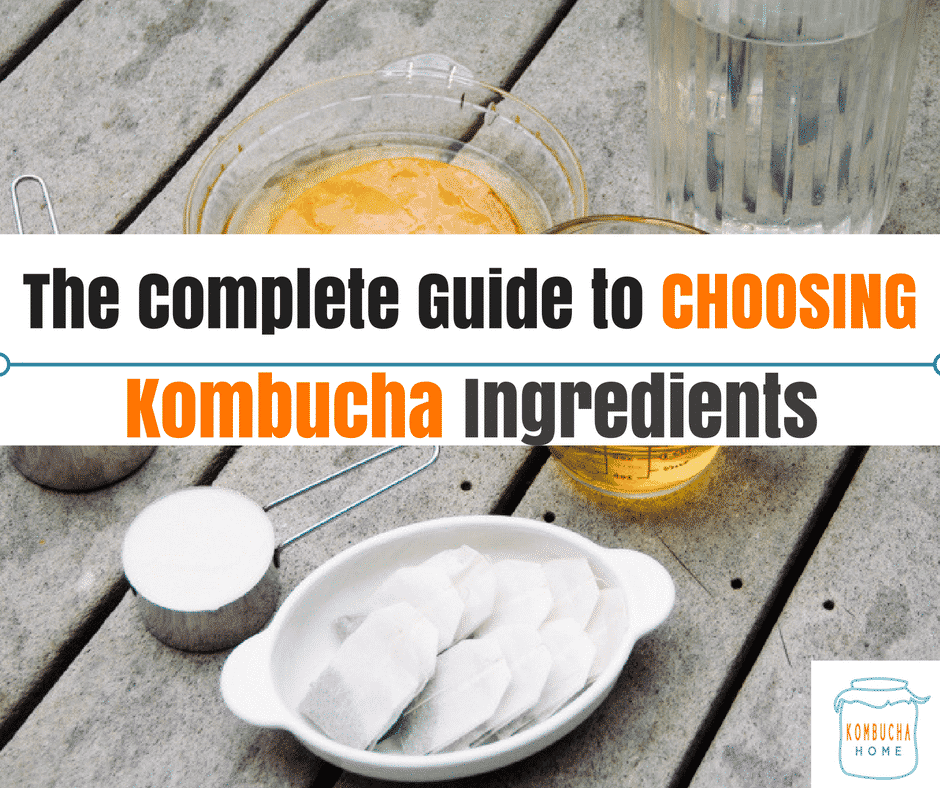
Although three words describe the only kombucha ingredients you really need – tea, sugar, water – it’s a bit more complicated than that when you want to really understand which ingredients are the best to use for making kombucha, and why. If you are interested in making Kombucha, read our basic kombucha brewing guide.
Tea: The SCOBY’s Traditional Food
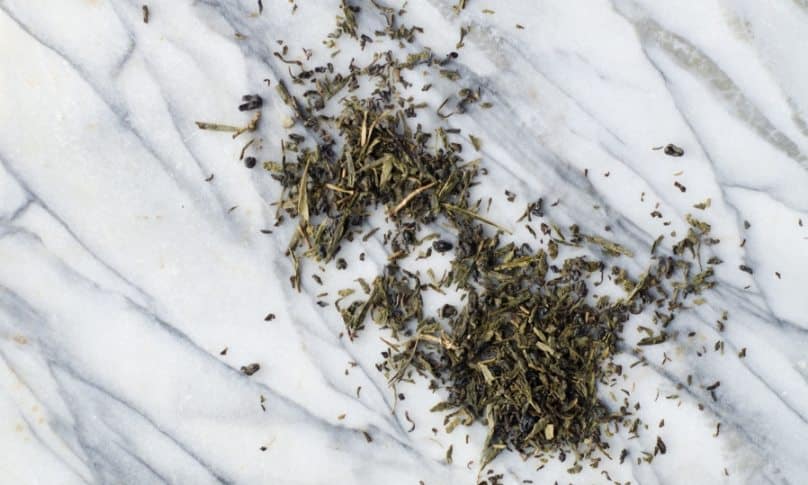
If you look into the history of kombucha you’ll see that it’s directly tied to the history of tea in China, where the tea bush (the Camellia sinensis plant) originated. The microorganisms in the SCOBY (Symbiotic Colony Of Bacteria and Yeast) need the nutrients in tea leaves to thrive. The phytochemicals, minerals, and caffeine in brewed tea are essential for keeping a SCOBY healthy over the long term. This means that even if you decide to use a SCOBY to brew a batch of herbal kombucha tea, it’s best if you store the SCOBY in sweetened regular tea in your SCOBY hotel to keep it in good shape.
That said, there’s still a lot of variety in the types of tea you can use for kombucha.
- Look for the freshest tea you can find. Because tea is popular around the world as a caffeinated drink, huge quantities of it are made every year, boxed up, and shipped to stores. However, not all of those boxes are sold quickly. Although properly-stored tea can last for several years before going stale, commercially-produced tea may go “off” more quickly because of changes in temperature and humidity. Look for the sell-by date on any box of tea before you buy it.
- Experiment with loose-leaf varieties. There’s a wide range of flavor just in the tea itself, depending on where it comes from and how it was processed. If you’ve got a tea shop in your area, that’s a good place to go to find new types of tea. You can buy just enough to use for one batch, to see how you like it.
- Avoid flavored teas. Black and green tea are often mixed with flavoring ingredients, some of which can harm the SCOBY. Don’t buy tea that has been flavored with artificial ingredients or essential oils, or that has bits of things like citrus fruits in it. If you want to add flavor to kombucha, you can do that after the SCOBY is done fermenting the tea.
- Tea types can affect the content of caffeine (see our how to reduce caffeine in your kombucha article). Some teas have more caffeine then others. Green tea, for example, has significantly less than black tea.
Black tea: comes in many varities (like English Breakfast or Darjeeling) is many people’s first choice for making kombucha tea. That’s because it’s rich in all of the vital nutrients that your SCOBY loves. You can choose loose-leaf tea, or simply buy a good brand of black tea in bags. Black tea is made from tea leaves that have been dried and oxidized, or fermented.
Pu-erh tea: this type is black tea that has been pressed, fermented, and aged. It has a strong flavor that carries over into the taste of the fermented kombucha tea. It’s a good idea to brew a cup of the tea alone before you try using it for kombucha, just to see if you like the way it tastes.
Oolong tea: this is not as oxidized as black tea, so it has a lighter flavor. This is a good tea to mix with black tea or green tea when you’re experimenting with different blends.
Green tea: this is made from leaves that have not been oxidized and fermented. This type of tea is popular as a drink by itself because it’s full of antioxidants, making it good for you as well as your SCOBY. Many people blend green and black tea together to get all of the rich nutrients of the fermented black tea along with the antioxidants in the green tea. Sencha tea and hochija tea are two varieties of green tea that make good kombucha tea.
White tea: this is the least processed type of tea, but it’s often the most expensive, because it take a lot of time to pick the young tea leaves and carefully dry them. Its sweet and delicate flavor may be overpowered by the strong acidity of the finished kombucha, but some people like adding it to a tea blend to give it an antioxidant boost.
Other exotic teas: there are literally thousands of types of teas (go to a Chinese tea shop to see what I mean). You can certainly try these gorment and exotic teas out. You’ll find subtle difference in the end flavor of your kombucha. However, the teas listed above are the standard teas, but don’t think you can’t experiement with more expensive, exotic teas — as long as they come from the camellia sinensis plant.
Non-Tea Teas: Most people use the word “tea” to mean a drink brewed from any kind of leaves, whether they come from the Camellia sinensis plant or not. You can use these herbal teas to make kombucha, as long as you refresh your SCOBY with “real” tea on a regular basis. Here are some popular choices:
- Rooibos tea comes from a South African bush and makes a reddish caffeine-free tea with a nicely spicy flavor.
- Yerba mate is made from the leaves of a South American bush and has a slightly sharp flavor. This herb tea does contain caffeine.
- Hibiscus tea is made from hibiscus flowers and is a popular herb tea in Mexico, where it’s drunk both hot and cold. This makes a very bright red tea that may change the color of your SCOBY.
If you are going to use herb tea as a source of food for your SCOBY, it’s best to mix it with regular black or green tea, just to keep up the health of the SCOBY.
Sugar: The SCOBY’s Energy Source
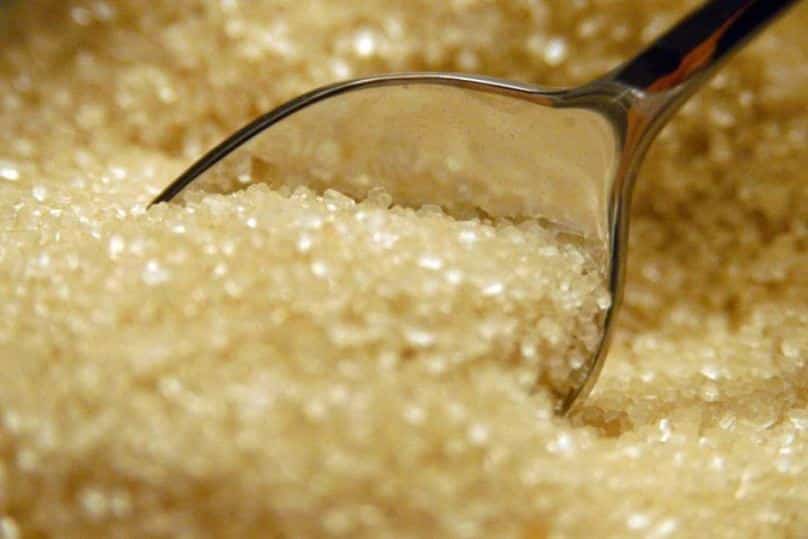
The microorganisms in the SCOBY rely on the nutrients in the tea for some of their food, but the main source of energy that the yeasts and bacteria use to grow and reproduce is sugar. Just as you can experiment with different types of tea, you can also choose one of several types of sugar when you’re brewing kombucha tea.
The type of sugar or sweetner you choose (if it’s not cane sugar or processed white sugar) will impact the final taste of your Kombucha.
Cane sugar is probably the most traditional form of sugar to use for kombucha and we feel, the best ‘standard choice’, whether you’re talking about its origins in China thousands of years ago, or the traditions that have grown up around modern kombucha brewing. Most people find that they get the best, most consistent results from using cane sugar when making kombucha, and it’s also the preferred choice to use as the food for the SCOBYs when you’re storing them in their SCOBY hotel.
Sugar Types
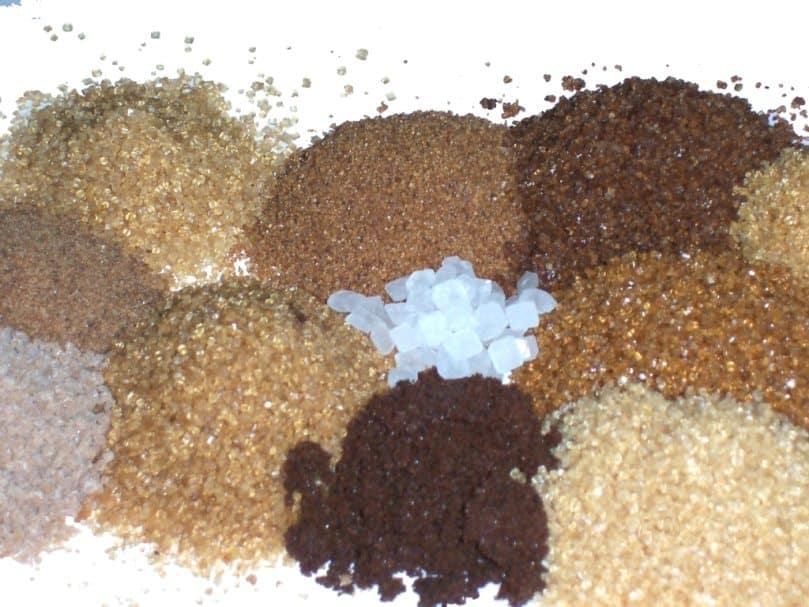
- Organic cane sugar or evaporated cane juice is minimally processed sugarcane that is refined enough to remove most of the non-sugar elements (the natural minerals in sugarcane) but still contains nutrients other than sucrose (sugar). This is the preferred choice for many kombucha brewers because it gives a slightly longer brewing time as well as a more nutrient-rich kombucha tea for drinking.
- Refined white cane sugar has been completely processed from sugarcane, and is made up of pure sucrose crystals. Because this form of sugar is usually the easiest for the SCOBY to digest, it’s a good choice for first-time brewers because it helps make the brewing process more consistent. It’s also the cheapest type of sugar to buy, which you might think about if you are on a budget.
- Unrefined cane sugar goes by many names and has many shapes, colors, and subtle tastes. It’s similar to the ‘organic cane sugar’ label we have. In fact, you can say evaporated cane juice and organic cane sugar are really just unrefined cane sugars — just a label for a specific way it’s processed. You’ll find unrefined can sugar sold as raw brown sugar (or raw sugar or raw cane sugar) in your local supermarket, piloncillo in a Mexican grocery, and jaggery or muscovado in Indonesian or African groceries. The health food industry also sells a very unprocessed variety or raw unrefined cane sugar called sucanat. In truth, the various names for this sugar refer to different processing which makes different shapes and colors of sugar (read our types of sugar for more information). It’s light to dark brown due to the extra mineral content, and is usually both harder and stickier than white sugar. Using this sugar will change the flavor of your finished kombucha tea as well as the brewing time. In general, the less refined the sugar is, the longer it will take the SCOBY to completely ferment the tea.
- Molasses is essentially the opposite of refined white cane sugar. It’s all of the minerals from the sugarcane, in liquid form. There’s still sucrose in the molasses, which means you can use it to make kombucha tea, but it’s not as sweet as white sugar. In addition, all of those extra ingredients will really slow down the action of the SCOBY. On the other hand, all of those extra ingredients are vitamins and minerals that are good for you, so it might be worth the effort! Molasses makes a very unique Kombucha.
- Brown Sugar: this is simply refined white sugar with molasses added back into it. We don’t recommend brown sugar for beginning brewers. The reason is that Brown sugar will make the brew time longer and affect the taste (some brewers report it makes ‘buch’ sour. You can use it if you want to experiment. One way to reduce the impact of the taste is to mix a ratio of brown sugar with say regular white sugar or cane sugar.
NOTE: If you’re going to experiment with unrefined sugars, be sure you’ve got a good backup supply of SCOBYs in your hotel first.
Syrup Types
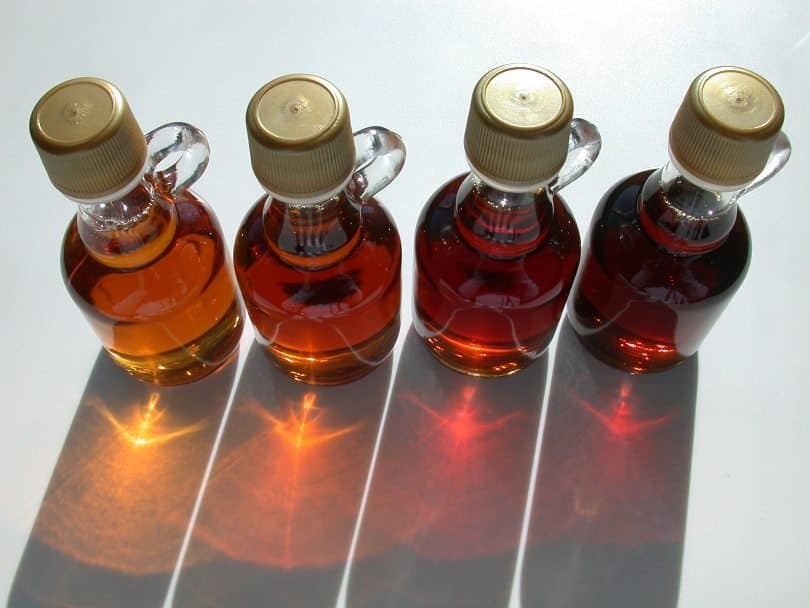
Besides sugar, you can use natural syrups found in nature to brew kombucha too, since these contain sugar. Playing around with these will affect the brew time and taste significantly, sometimes for the worst, sometimes for the better.
Hint: one trick you can do to reduce possible negative flavor impact, reduce brew time, and keep your SCOBY healthy is to MIX sugar and syrup types. For example, 50 percent organic cane sugar with 50 percent molasses. Or something like 75 percent processed white sugar with 25 percent honey.
Honey is another popular choice for many brewers, although people often use it as part of second fermentation kombucha instead of during the first brewing session with the SCOBY. It’s popular because of the natural health benefits of pure honey, including vitamins and minerals not found in refined cane sugar.
Some SCOBYs may not be able to process honey. If you want to use honey, start by blending it with cane sugar and see how your SCOBY reacts. Do not use raw honey, which contains natural antibacterial compounds. Since the SCOBY is made up of bacteria, these compounds will harm the SCOBY.
Agave syrup is made from the agave plant, the same plant that is used to make tequila. It’s a thin syrup that has more fructose than sucrose, which may make it less safe for people with diabetes. The lack of glucose will also affect the brewing time, the final flavor, and the amount of organic acids in the final kombucha tea. Yes, you can brew Kombucha with Agave.
Maple syrup is another sweetener that changes the flavor of the tea, but it still has a lot of sucrose in it, so the SCOBY will be able use it like cane sugar. However, it does have additional minerals that will probably change the brewing rate. Read our guide to flavoring kombucha with Maple Syrup.
Non-Sugar Sugars
One thing that your SCOBY will not tolerate at all is artificial sugar, which is a mixture of chemicals that works on human taste buds to simulate a sweet flavor. Your SCOBY needs some form of sucrose to survive, and using artificial sweetener will kill it quickly. If you want to make sugar-free kombucha you can do that without using artificial chemicals.
There are other types of plant sugars that are natural sweeteners, but still not suitable for use in kombucha because they don’t contain any sucrose, including stevia and xylitol. If you want to use these sweeteners instead of sugar to make your finished kombucha tea sweeter, they’ll work well, but don’t use them in the brewing process with the SCOBY.
Kombucha Sweetner Guide
Water: The SCOBY’s Home

The SCOBY needs a clean and safe place to live and grow, and that means clean water. Yes, you’ll be “dirtying” the water with tea and sugar, but you need to make sure that there’s nothing else in the water to harm the SCOBY.
Your best choice for a healthy SCOBY is to use filtered water because it’s free of any contaminants. There are many options for filtering water that are convenient for most people, including pitchers with removable filters, in-line filters that fit into your plumbing, or small replaceable filters that you can fit into the faucet of your sink.
Buying bottled water at the store can be a good choice, as long as you look at the labels. Sometimes it’s simply tap water that’s been bottled and capped, and not much different than what you’d get by turning on the tap in your kitchen. Other types of bottled water are mineral water and spring water, and these might also contain contaminants that will affect the SCOBY. Don’t get sparkling water, which generally has a lot of extra minerals like sodium.
Distilled water is purified, but some people think that it’s too purified to keep the SCOBY healthy. The microorganisms in the SCOBY use the trace minerals in water in the same way as they process the nutrients and minerals that come from the tea leaves and the sugar. While you want to keep your brewing water clean, you probably don’t have to use distilled water unless you have no other way to filter the water you normally use to drink.
Tap water will almost always contain chlorine, which most water treatment systems use to get rid of bacteria. The bacteria in your SCOBY will not appreciate this! You can get rid of most of the chlorine in tap water by boiling it for 20 minutes, but it’s better to run your tap water through a filter instead.
Read our guide on choosing the best water for making Kombucha.
Flavoring Ingredients: Now It’s Your Turn!
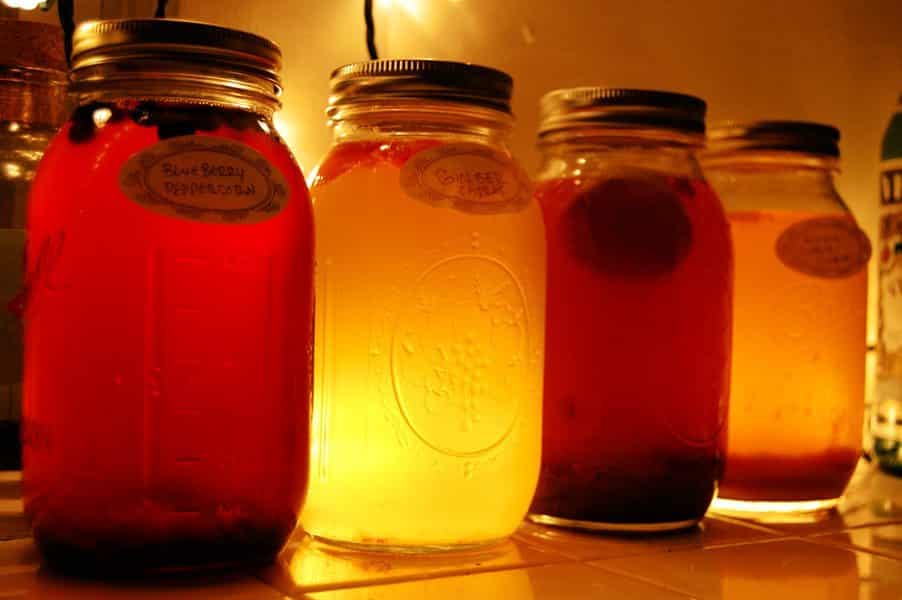
After all that fuss about making sure the SCOBY has what it needs, it’s time for you to get what you want: delicious kombucha tea that has exactly the flavor you want.
In general, it’s best to wait to add flavoring ingredients until after you’ve removed the SCOBY. You can change the basic flavor of your kombucha tea by experimenting with different types of tea, different blends of tea, and different types and blends of sugar, but anything else that you put into the brewing container has the potential to harm the SCOBY, especially through contamination by mold and toxic bacteria.
Once the SCOBY is removed, however, the sky’s the limit when it comes to flavoring! You can add fruit juice, sparkling water, or even alcohol and liqueurs to your kombucha as soon as it’s done brewing and drink it right away. You can also add ingredients like fresh or dried fruit, spices and herbs, or exotic ingredients like lemongrass or grated carrots, and let the residual yeasts and bacteria continue to ferment the mixture. Second fermentation is a good way to add carbonation to kombucha as well as adding flavor.
So put your SCOBY back in its home full of sweet black tea, and get ready for a kombucha flavor explosion as you learn to flavor kombucha to make a probiotic brew that’s as delicious as it is nutritious.
The Ultimate Kombucha Flavor Table Guide
Flavoring Kombucha is easy…and hard. There’s many ways to modify the basic texture and taste of your booch, from the basic methods of changing the tea types, adding in fruits, adjusting the fermentation times to more advanced flavoring such as flavoring the primary fermentation, swapping tea for juice, and more! Here’s a flavoring table guide we created to help simplify things.Show 102550100 entriesSearch:
| Method of Flavoring First Ferment | Flavor Impact | SCOBY Impact | Brewing Difficulty |
|---|---|---|---|
| Use Different Teas | very low – low | very low | very easy |
| Use Different Sugar Types/ Sources | medium -high | medium | very easy – easy – medium |
| Blending Tea with a Tisane / Herbal Tea | low – medium | medium – high | easy – medium |
| Replacing Sugar with Fruit | medium – high | low | medium |
| Blending Tea with Juice | medium – high | medium | medium |
| Replacing Tea with Juice | high – very high | high | medium – hard |
| Adding in Hops | low – medium | low | medium |
| Adding in Extra Flavorings (herbs, spices, essential oils, flowers) | low – high | low – medium | easy – medium |
| Flavor Impact: How much flavor change over regular ‘black tea fermented kombucha’ | *SCOBY Impact: how it affects SCOBY health over several brews | *Difficulty: how likely it is for the fermentation to fail or experience problems |

